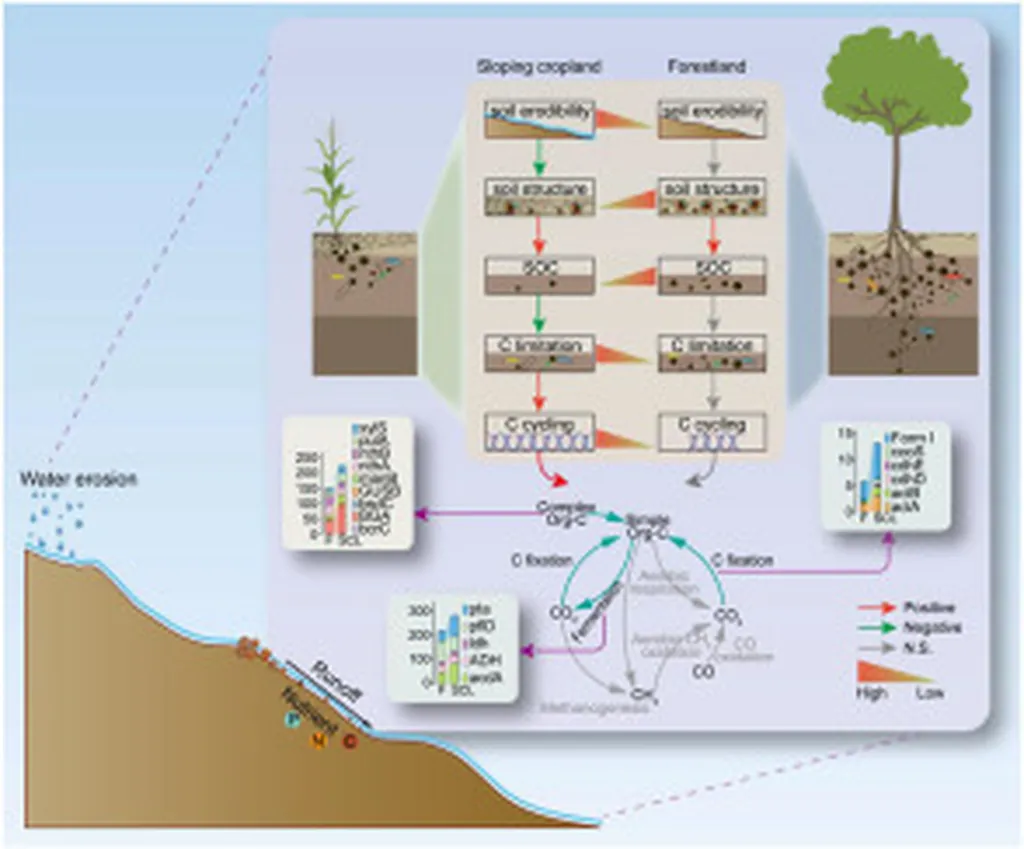In the heart of China’s agricultural landscape, a pressing issue is unfolding that could have significant implications for the energy sector and global carbon markets. Soil erosion, a silent menace, is accelerating carbon cycling in erosion-prone sloping cropland, according to a recent study published in the *Journal of Soil and Water Conservation Research*. The research, led by Yulong Shi from the Agricultural Clean Watershed Research Group at the Chinese Academy of Agricultural Sciences, sheds light on the intricate relationship between soil erosion, carbon limitation, and microbial activity.
Soil erosion is not just a problem for farmers; it’s a ticking time bomb for the energy sector. As soil erodes, it loses its carbon content, exacerbating microbial carbon limitation. This, in turn, stimulates an increase in the abundance of carbon cycle genes involved in complex organic carbon degradation. “Soil erosion stimulates an increase in the abundance of carbon cycle genes, particularly those involved in complex soil organic carbon degradation, as a response to carbon limitation in erosion-prone sloping cropland,” Shi explains.
The study found that sloping cropland exhibited a 31.70% higher soil erodibility compared to forestland, making it more prone to soil erosion. Moreover, the soil organic carbon content in sloping cropland was 61.72% lower than that in forestland. Although there was no significant difference in absolute enzyme activities between sloping cropland and forestland, the specific enzyme activities per unit of soil organic carbon in sloping cropland were significantly higher.
The loss of soil organic carbon further exacerbates carbon limitation in sloping cropland and stimulates an increase in the abundance of carbon cycle genes involved in complex organic carbon degradation. Additionally, the carbon cycling genes enriched in sloping cropland demonstrated a significant positive correlation with soil CO2 emissions.
The findings provide scientific support for developing effective soil and water conservation measures to reduce soil carbon loss and maintain the ecological balance of sloping cropland. This is crucial for the energy sector, as soil carbon loss can impact carbon markets and the overall carbon balance.
The research also highlights the need for a better understanding of the relationship between soil erosion, carbon limitation, and microbial activity. This understanding is essential for developing effective soil and water conservation measures that can mitigate the impacts of soil erosion on carbon cycling and the energy sector.
As the world grapples with the challenges of climate change and the need for sustainable energy, this research offers a glimpse into the complex interplay between soil erosion, carbon cycling, and microbial activity. It underscores the importance of soil conservation in maintaining the ecological balance and mitigating the impacts of climate change.
In the words of Shi, “The findings provide scientific support for developing effective soil and water conservation measures to reduce soil carbon loss and maintain the ecological balance of sloping cropland.” This research is a stepping stone towards a more sustainable future, where the energy sector can thrive without compromising the health of our soils and the environment.

